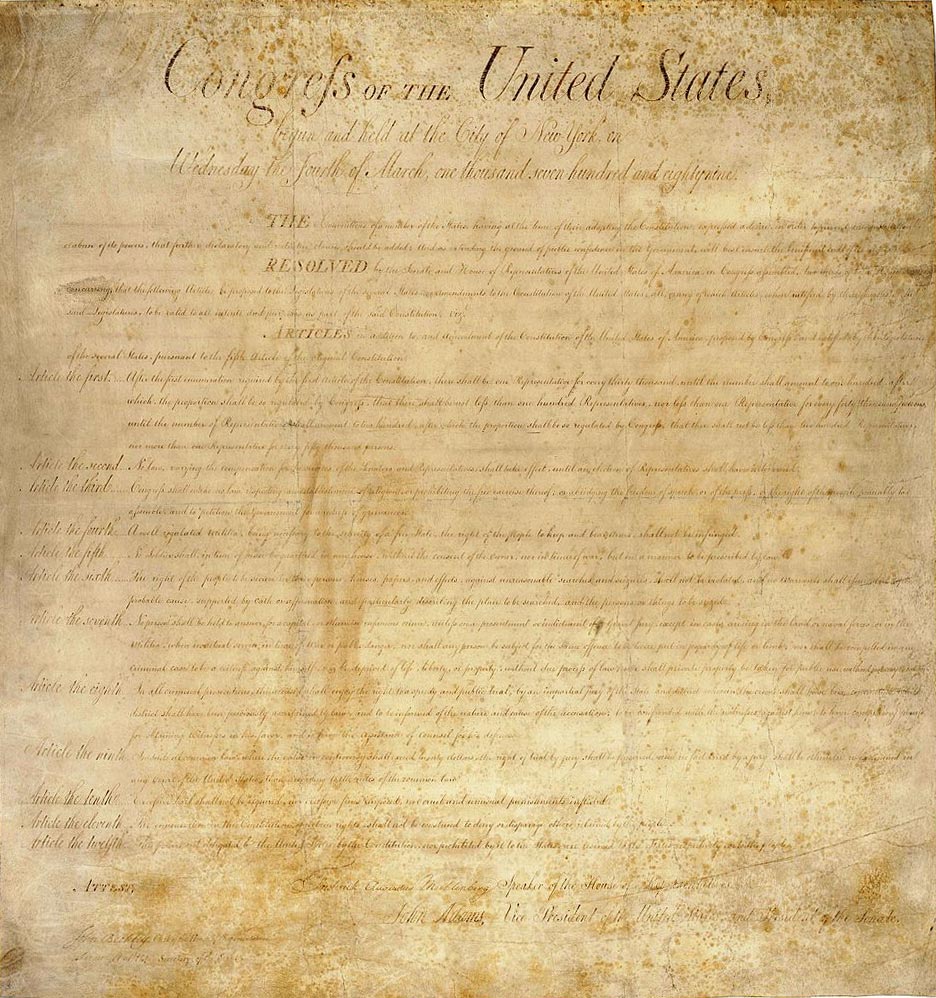| United States Constitution | |
|---|---|
 |
|
| The U.S. Constitution | |
| Preamble | |
| Articles of the Constitution | |
| I ‣ II ‣ III ‣ IV ‣ V ‣ VI ‣ VII | |
| Amendments to the Constitution | |
| Bill of Rights | |
| I ‣ II ‣ III ‣ IV ‣ V ‣ VI ‣ VII ‣ VIII ‣ IX ‣ X | |
| Additional Amendments | |
| XI ‣ XII ‣ XIII ‣ XIV ‣ XV ‣ XVI ‣ XVII ‣ XVIII ‣ XIX ‣ XX ‣ XXI ‣ XXII ‣ XXIII ‣ XXIV ‣ XXV ‣ XXVI ‣ XXVII | |
| View the Full Text | |
| Original Constitution | |
| Bill of Rights | |
| Additional Amendments |
The Fifth Amendment is a part of the Bill of Rights that protects a person against abuse of government authority in a legal process. This amendment is widely known to most Americans than the rest of the amendments due to the famous phrase: I plead the fifth. This phrase is frequently used as a defense in criminal trials. The amendment consists of 5 different clauses. These clauses are: Grand jury clause, double jeopardy clause, self-incrimination clause, due process clause and the takings clause. The 5th Amendments assures Americans several basic rights such as the right not to be punished or tried more than once for the same crime, right to appropriate reasonable compensation for any private property taken by the government for public use, and the right to trial for certain crimes by Grand Jury.
Text
No person shall be held to answer for a capital, or otherwise infamous crime, unless on a presentment or indictment of a Grand Jury, except in cases arising in the land or naval forces, or in the Militia, when in actual service in time of War or public danger; nor shall any person be subject for the same offense to be twice put in jeopardy of life or limb; nor shall be compelled in any criminal case to be a witness against himself, nor be deprived of life, liberty, or property, without due process of law; nor shall private property be taken for public use, without just compensation.
Grand Jury Clause
 Grand Jury is a group of citizens, summoned to a court by the sheriff in order to consider complaints and accusations leveled against an individual suspected of engaging in a criminal activity. This clause guarantees that a person cannot be accused with serious federal crime unless with an indictment by a grand jury. Grand juries meet in a secret place whereby only the jury members, witnesses and the prosecutor are allowed to be present.
Grand Jury is a group of citizens, summoned to a court by the sheriff in order to consider complaints and accusations leveled against an individual suspected of engaging in a criminal activity. This clause guarantees that a person cannot be accused with serious federal crime unless with an indictment by a grand jury. Grand juries meet in a secret place whereby only the jury members, witnesses and the prosecutor are allowed to be present.
The Grand Jury does not convict a defendant, rather the members look at an evidence and determine whether there is enough evidence that shows that the accused is guilty or not. Moreover, defendants are not allowed to have their attorneys present during questioning and are not allowed to call witnesses in their favor. This clause does not protect people serving in the armed forces.
Double Jeopardy Cause
This clause of the 5th Amendment guarantees that a person cannot be tried or punished more than one time for the same crime. It is meant to protect Americans from being tried repetitively until the government gets its ideal verdict. According to the founding fathers, once a person is tried and a verdict is reached, that should be final and there should not be another trial. This was crucial to the founding fathers since the colonial British had many instances where the king tried people repeatedly in scenarios where the ruling went against his wishes. Nowadays, this protection is applicable to all cases in which a defendant can be punished. However, a person can be tried for the same crime twice if 2 or more civil entities get jurisdiction over the time. Also, if the first case is found to be fraudulent in any way, the case can be retried.
Self-Incrimination Clause
The very first opening statement of the Miranda warning, read to a person when being arrested allows the person to remain silent and not to give any information to the authority. This statement also makes the 5th Amendment to be one the most famous and familiar part of the constitution to Americans. In English history, people would get tortured for not pleading guilty to crimes they were accused of.
Eventually, English citizens stood up against this and it became the basis for the right to desist from testifying against oneself which was formalized as the self-incrimination clause of the 5th Amendment. In modern days, forced confessions or confessions made under pressure are disregarded in a court. This clause however does give an accused person the right to reject physical evidence including refusing to stand in a police lineup, DNA samples, and finger prints.
Due process clause
This clause guarantees that the government cannot take a person’s life, liberty or property without following the due process. This means that the government should obey written laws when dealing with people. This also means that a judge or a policeman cannot imprison a person just because they do not like what that person did; rather, they must first prove that the person indeed violated a written law. The clause also guarantees a person to be treated fairly and be notified of the issues at hand whenever the government deals with that person in an administrative or criminal matter.
The Takings Clause
This is also known as the eminent clause and guarantees that if at any time the government needs to take a private property for public use; then, the owner should be paid a reasonable amount for the property. In colonial America, it was common for the government to take private properties for public use without compensating the owners. Nowadays, the Supreme Court has extended the right to even get compensation when your property gets damaged or its value lowered by a government activity.